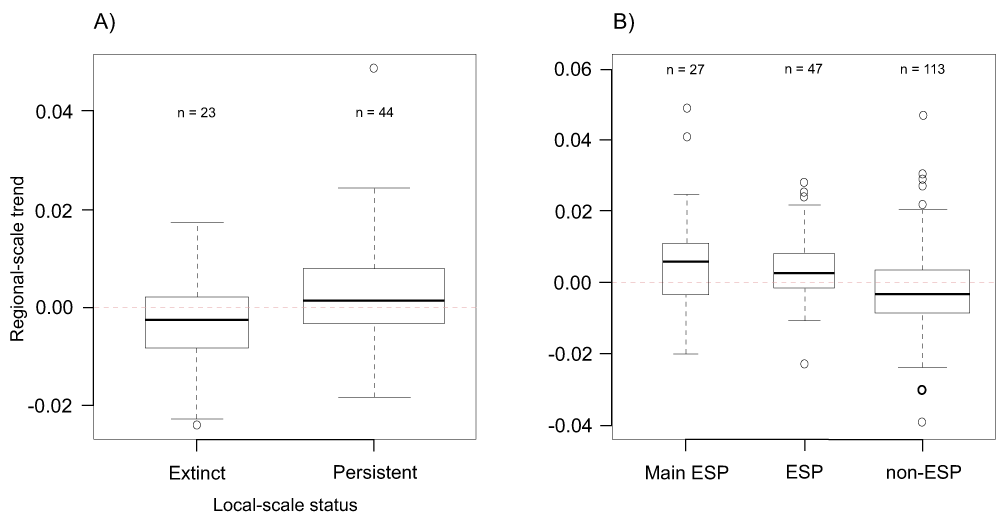Keywords
bee, pollinator, decline, extinction, ecostystem provider, crops, decline
This article is included in the Ecology and Global Change gateway.
bee, pollinator, decline, extinction, ecostystem provider, crops, decline
There is widespread concern regarding the fate of pollinators and the ecosystem services they deliver1. However, the information we have is still limited and at times appears contradictory. Four recent articles, three from Science and one from PNAS, highlight this point2–5. Burkle et al.2 show that 50% of the bee species in one locality in the Midwestern USA became locally extinct during the last century, which in combination with recent evidence that wild pollinators are critical to global crop pollination3, has led some to conclude that we might face an imminent collapse of crop pollination4. In contrast, Bartomeus et al.5 explored bee declines over a similar time scale but at a regional scale (the northeastern USA) and reported only a 15%, non-significant decline in bee species richness. Here we present new analyses that help to reconcile this apparent contradiction in the magnitude of bee declines, while also suggesting that any effects on crop pollination might be less than previously thought.
First, we used the 67 bee species included in both the regional-scale5 and the local-scale2 analyses (see data file below) to show that the two studies in fact found broadly consistent results: the locally extinct species of Burkle2 tend to be declining regionally, whereas the locally persistent species tend to be increasing regionally (Figure 1A, ANOVA: F = 5.89, df = 1,65, P = 0.01). Second, we used data from Garibaldi et al.3 on the bee species that provide ecosystem services to four crops in the region covered by Bartomeus et al.5 to show that these ecosystem service providers tend to have increasing population trends compared to non-ecosystem service providers (Figure 1B, F = 7.12, df = 2,184, P = 0.001). All analyses were conducted in R6.

A) For species that either became locally extinct or persisted in Carleville, Illinois. B) For species that either are not ecosystem-service providers to crops (non-ESP), are at least occasionally ecosystem-service providers to crops (ESP), or are among the species cumulatively responsible for 90% of the pollinator visitation to at least one crop (main ESP). Regional data from Bartomeus et al.5, local data from Burkle et al.2 and crop pollinator data from Garibaldi et al.3.
Thus, our analyses demonstrate that, as one would expect, local-scale extinctions do not imply regional-scale extinctions; and that bee species that are important crop pollinators are less likely to be declining at the regional scale. It is important to remember that all bee species may well be crucial to providing ecosystem functions in natural systems and therefore merit conservation attention.
This work was supported by United States Department of Agriculture NIFA-AFRI 2009-65104-05782 to R Winfree and N M Williams, Multi-state project 08204 to R Winfree and NSF BIO DEB collaborative grant #0554790/0516205 to C Kremen, N M Williams, and R. Winfree.
| Views | Downloads | |
|---|---|---|
| F1000Research | - | - |
|
PubMed Central
Data from PMC are received and updated monthly.
|
- | - |
Competing Interests: No competing interests were disclosed.
Competing Interests: No competing interests were disclosed.
Alongside their report, reviewers assign a status to the article:
| Invited Reviewers | ||
|---|---|---|
| 1 | 2 | |
|
Version 1 02 Jul 13 |
read | read |
Provide sufficient details of any financial or non-financial competing interests to enable users to assess whether your comments might lead a reasonable person to question your impartiality. Consider the following examples, but note that this is not an exhaustive list:
Sign up for content alerts and receive a weekly or monthly email with all newly published articles
Already registered? Sign in
The email address should be the one you originally registered with F1000.
You registered with F1000 via Google, so we cannot reset your password.
To sign in, please click here.
If you still need help with your Google account password, please click here.
You registered with F1000 via Facebook, so we cannot reset your password.
To sign in, please click here.
If you still need help with your Facebook account password, please click here.
If your email address is registered with us, we will email you instructions to reset your password.
If you think you should have received this email but it has not arrived, please check your spam filters and/or contact for further assistance.
Comments on this article Comments (0)